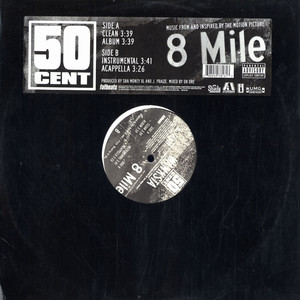Lyrics are words that make up a song, usually consisting of verses and choruses. The writer of lyrics is a lyricist. The words to an extended musical composition such as an opera are, however, usually known as a "libretto" and their writer, as a "librettist". The meaning of lyrics can either be explicit or implicit. Some lyrics are abstract, almost unintelligible, and, in such cases, their explication emphasizes form, articulation, meter, and symmetry of expression. Rappers can also create lyrics that are meant to be spoken rhythmically rather than sung.

"Wanksta" is a song by American rapper 50 Cent, released on November 5, 2002, as the second single from the soundtrack to the film 8 Mile (2002). The single, produced by Sha Money XL and John "J-Praize" Freeman, reached number 13 on the US Billboard Hot 100. The song originally appeared on 50 Cent's mixtape No Mercy, No Fear, released in August 2002.
Newsvine was a community-powered, collaborative journalism online newspaper which drew content from its users and syndicated content from mainstream sources such as The Associated Press. Users could write articles, "seed" links to external content, and discuss news items in an online forum. These news items were submitted by both users and professional journalists. Newsvine, the company, was not a news bureau and exercised no editorial voice, but provided social news platform for the online community which had grown around it. Members decided with their online actions what news articles stay on the site and what news is removed. Newsvine was named the Top News Site of 2006 and one of the 50 Best Websites of 2007 by Time magazine.
Ultimate Guitar, which is also known as Ultimate-Guitar.com or simply UG, is an online platform for guitarists and musicians. Its website and mobile application provides guitar tablature catalogues and chord sheets. UG's platform also includes video courses, reviews of music and equipment, interviews with notable musicians and forums. It was started on October 9, 1998, by Eugeny Naidenov. Since 2008, Ultimate Guitar operates from San Francisco, US, with its platform available in most of the countries. As of December 2021, the site and mobile app contain 1,600,000 tabs and chords for over 900,000 songs from over 115,000 artists. UG app has been downloaded more than 53,000,000 times.
Am I Right is a popular music and humor website dedicated to topics as song parodies, misheard lyrics (mondegreens), and album cover parodies. Visitors may submit their own without registering. It was created by Charles R. Grosvenor Jr. The site was first launched March 23, 2000, and has since grown considerably.

Amie Street was an indie online music store and social network service created in 2006 by Brown University seniors Elliott Breece, Elias Roman, and Joshua Boltuch, in Providence, Rhode Island. The site was notable for its demand-based pricing. The company was later moved to Long Island City in Queens, New York. In late 2010, the site was sold to Amazon who redirected customers to their own website.
Lala was an online music store created by Silicon Valley entrepreneur Bill Nguyen. The service allowed members to legally create online shareable "playlists" of their own uploaded music which could play full length songs for other registered Lala members, purchase MP3s, stream music on a one-time basis or as inexpensively purchased "web songs," buy new CDs from the Lala store, leave blurbs on other members' pages, and participate in the community forums. Lala contracted with major labels and offered a large catalog of albums to stream or purchase. Their home page claimed over 8 million licensed songs available.

Oink's Pink Palace was a prominent BitTorrent tracker which operated from 2004 to 2007. Following a two-year investigation by the International Federation of the Phonographic Industry (IFPI) and the British Phonographic Industry (BPI), the site was shut down on 23 October 2007, by British and Dutch police agencies. These music industry organisations described OiNK as an "online pirate pre-release music club", whereas former users described it as one of the world's largest and most meticulously maintained online music repositories. About a month before the shut-down, music magazine Blender elected OiNK's creator, British software engineer Alan Ellis, to their The Powergeek 25 — the Most Influential People in Online Music list. Alan Ellis was tried for conspiracy to defraud at Teesside Crown Court, the first person in the UK to be prosecuted for illegal file-sharing, and found not guilty on 15 January 2010.

Shelfari was a social cataloging website. Shelfari users built virtual bookshelves of the titles they owned or had read, and could rate, review, tag, and discuss their books. Users could also create groups that other members could join, create discussions, and talk about books, or other topics. Recommendations could be sent to friends on the site for what books to read.

YouTube is an American online video-sharing platform headquartered in San Bruno, California, founded by three former PayPal employees—Chad Hurley, Steve Chen, and Jawed Karim– in February 2005. Google bought the site in November 2006 for US$1.65 billion, since which it operates as one of Google's subsidiaries.

World Have Your Say (WHYS) is an international BBC global discussion show, that was broadcast on BBC World Service every weekday at 16:00 UTC and on BBC World News every Friday at 15:00 UTC.
Deezer is a French music rental service.

Jango is an American free online music streaming service available worldwide.
Spotify is a Swedish audio streaming and media services provider founded on 23 April 2006 by Daniel Ek and Martin Lorentzon. It is one of the largest music streaming service providers, with over 527 million monthly active users, including 210 million paying subscribers, as of March 2023. Spotify is listed on the New York Stock Exchange in the form of American depositary receipts.
Grooveshark was a web-based music streaming service owned and operated by Escape Media Group in the United States. Users could upload digital audio files, which could then be streamed and organized in playlists. The Grooveshark website had a search engine, music streaming features, and a music recommendation system.

SoundCloud is a German music streaming service that enables its users to upload, promote, and share audio. Founded in 2007 by Alexander Ljung and Eric Wahlforss, SoundCloud is one of the largest music streaming services in the world and is available in 190 countries and territories. The service has more than 76 million active monthly users and over 200 million audio tracks as of November 2021. SoundCloud offers both free and paid memberships on the platform, available for mobile, desktop and Xbox devices. SoundCloud has evolved from a traditional online streaming platform to an entertainment company.

Multiply was a social networking service with an emphasis on allowing users to share media – such as photos, videos and blog entries – with their "real-world" network. The website was launched in March 2004 and was privately held with backing by VantagePoint Venture Partners, Point Judith Capital, Transcosmos, and private investors. Multiply had over 11 million registered users. The company was headquartered in Boca Raton, Florida but moved to Jakarta, Indonesia early in 2012 and recently announced intentions to switch to e-commerce, dropping the social networking aspect entirely. Quantcast estimates Multiply had 2.47 million monthly U.S. unique visitors at their peak on July 30, 2012.
Genius is an American digital media company founded on August 27, 2009, by Tom Lehman, Ilan Zechory, and Mahbod Moghadam. Its site of the same name serves as an online music encyclopedia allowing users to provide annotations and interpretation to song lyrics, news stories, sources, poetry, and documents.







